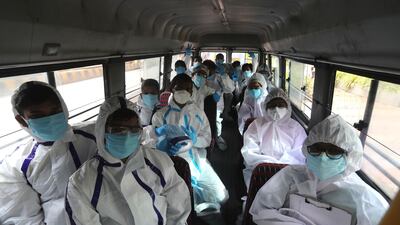India has approved a second locally developed Covid-19 vaccine for human trials as surging infections put the country on course to overtake Russia as the third-most affected nation in the novel coronavirus pandemic.
Pharmaceuticals firm Zydus said on Friday that it had received approval from Indian regulators to begin human studies of its potential vaccine.
The vaccine showed a "strong immune response" in animal studies, and the antibodies produced were able to completely neutralise the wild type virus, Zydus, part of India's Cadila Healthcare group, said in a statement to Indian stock exchanges.
India's approval for Zydus comes days after privately held Bharat Biotech got a green light for human studies for its vaccine candidate.
____________
Coronavirus around the world
____________
Zydus will begin human trials this month on more than 1,000 subjects at multiple sites in India, it said. The company also plans to ramp up its production capacity for the vaccine contender to serve Indian and global demand, it added.
There were no safety concerns for the vaccine candidate in repeat dose toxicology studies, Zydus said. In rabbits, up to three times the intended human dose was found to be safe, well tolerated and immunogenic.
No vaccine has yet been approved for commercial use against Covid-19, but more than a dozen from over 100 candidates globally are currently being tested in humans, and some have shown potential in early-stage trials.
India's health ministry reported another single-day record increase in coronavirus cases on Friday. The 20,903 new infections took the national total to 625,544, while another 379 deaths in the previous 24 hours raised the number of fatalities to 18,213.
With the current rate of infections, India is expected to surpass Russia’s 660,000 cases in coming days and become the third worst-hit country after the United States and Brazil. It has the eighth-most fatalities in the world, according to a Johns Hopkins University tally, but both numbers are thought to be far higher than has been confirmed around the world.
Despite the increasing number of cases, India has continued easing lockdown restrictions in most of the country except for the highest-risk areas.
All monuments will be reopened to the public from Monday, subject to limits on the number of visitors and the mandatory wearing of masks.
A strict two-month lockdown that began in late March dealt a blow to the faltering economy and left millions of low-paid migrant workers stranded in cities without jobs and unable to return to their homes in rural areas.






















